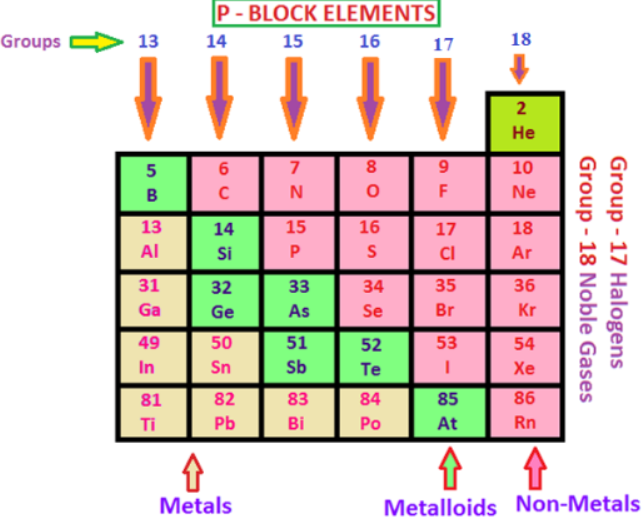All the elements in the category of p-block elements have different trends for their reaction with the acids and alkalis and in this article, their reactions with the acids and alkalis will be discussed.
At a moderate temperature, the boron does not show any reaction with the acids and alkalis. However, aluminum reacts with the aqueous alkalis and mineral acids and shows the amphoteric character. Boron only reacts with the nitric acid and makes the boric acid in the result. Gallium, indium, and aluminum are dissolved in the acids and makes the corresponding trivalent ions. However, the reaction of aluminum, and gallium with the acids is reduced as the protective film of the oxides is formed. When thallium is dissolved in the acid it makes the univalent ions. While reacting with the hydrochloric acid it remains passive due to the formation of thallium chloride that is insoluble in the water. Boron gets dissolved only in the fused alkalis, whereas gallium and aluminum are dissolved in both aqueous and fused form of the alkalis. Indium is inert and it does not show any reaction with the alkalis.

Carbon does not react with acids. Tin reacts with the acid salts, bases and with the strong acids. Lead has the passivated surface of lead oxide so it does not react with the sulphuric acid, however, lead slowly reacts with the hydrochloric acid and gives NH3 and HCl. In the cold alkalis, lead is slowly dissolved and gives plumbites. Under normal conditions, silicon does not react with most of the acids but it is dissolved in the hydrofluoric acid due to the complex formation. It forms the silicate ions by reacting with the hot alkali solutions.
Under normal conditions, nitrogen does not give any reaction with acids and alkalis. Phosphorus does not give any reaction to the diluted and the non-oxidizing acids. In the hot and concentrated nitric acid and sulphuric acid, the antimony is dissolved. In the absence of oxygen, it does not react with hydrochloric acid. Bismuth is dissolved in concentrated nitric acid and sulphuric acid. Its reaction with the sulphuric acid gives the S02 gas. Bismuth reacts with alkalis and produces the white flakes.
Oxygen does not react with most of the acids and alkalis under normal conditions. Tellurium does not show any reaction with the diluted and non-oxidizing acids. Also, it does not react with alkalis under normal conditions. At the room temperature, the powder of Sulphur can react with hydrochloric acid and it will produce the hydrogen gas and Sulphur chloride. Sulfur does react with the alkalis but in their aqueous solutions.
Fluorine reacts with the diluted acids and produces ozone and oxygen. It also reacts with the diluted solutions of aqueous hydroxides and gives the oxygen fluoride. Chlorine reacts with the hot aqueous alkalis and produces the chlorate ions. Bromine is dissolved in the aqueous hydroxide solutions of the alkalis and give bromides. The reaction of iodine with hot and concentrated nitric acid gives iodic acid. Iodine gives the iodate ions by reacting with the hot aqueous solution of the alkali.